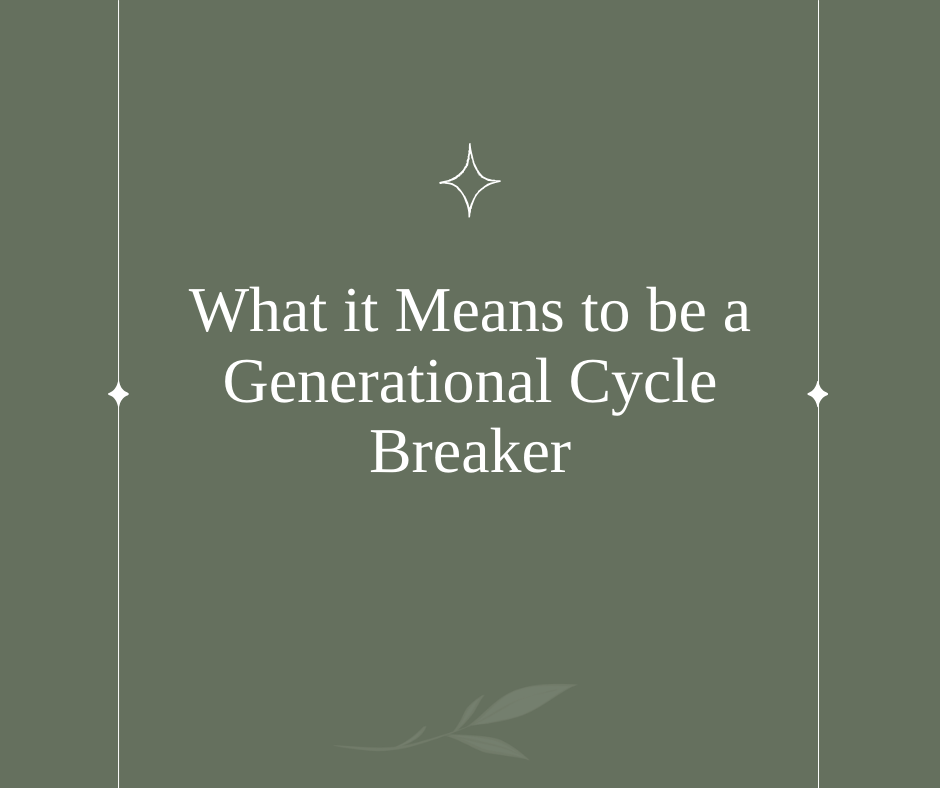As parents, we have a great deal of influence over our children. We shape their lives through the care we give and by modelling beliefs and behaviours, just as our lives were shaped by the people who cared for us.
If we look at our own upbringing, we can probably identify certain traits our parents or caregivers have passed down to us. Some generational traits are positive and beautiful. Maybe you’ve inherited your mother’s eyes or your father’s love of nature. But some are not. If you suspect you’ve inherited unhealthy beliefs and behaviours from your parents or caregivers, you may decide you want to prevent these from being passed on to your own children. This means you want to be a generational cycle breaker.
What Are Generational Cycles?
Generational cycles are repeated patterns of harmful beliefs and behaviours that are passed down through generations. This happens because children tend to absorb and adopt similar/ the same belief systems and behavioural patterns that they learn from their parents or caregivers in childhood.
An example of a harmful belief system that can be passed down through generations is viewing life through the lens that bad things are going to happen. In therapy, we call this catastrophising. If someone has a parent or caregiver with a catastrophic mindset, it is highly likely they will adopt the same thinking style. Then, if they go on to have their own children, they are also likely to adopt the same thinking style. That’s how the cycle continues.
People pleasing is an example of a harmful or toxic behavioural pattern that can be passed from one generation to the next. Imagine a child learns they receive love and attention and have their needs met by agreeing and surrendering to the demands of their caregivers. Naturally, they will repeat this people pleasing behaviour, reinforcing and strengthening the idea that compliance = love. When that person becomes a parent themselves, their children pick up the same message. Children tend to behave in line with what’s modelled to them, so as they get older, they adopt the same pattern of people pleasing behaviour. And on and on it goes...
Why is it Important to Be a Cycle Breaker?
It’s important to break these generational patterns because they are harmful, toxic patterns that can cause emotional and relational distress that can manifest as symptoms of anxiety and depression. It’s also important to break cycles so our children don’t adopt these harmful patterns and eventually pass them onto their own children.
What Does This Mean for Us as Parents?
Generational pattern breaking is a huge responsibility and a huge pressure. Doing the work alongside parenting can be completely exhausting, but it’s worth doing because we are making sure generational cycles end with us.
By creating a different template for our children – a more helpful, adaptive, functional template – we are giving them something better to adopt and pass onto their own future children. In other words, the work we are doing now will benefit generations to come.
Where Do I Start?
You can try and break these patterns on your own. There are lots of resources and self-help books out there to assist you depending on what generational pattern you’re trying to break. However, it may be that you need the help of a therapist to understand the toxic cycles, where they originated, and how they are impacting your life now. Once you’ve done the work required to understand these things, you can start practicing new ways of thinking and behaving. This work can be challenging, so once again, the support of an experienced therapist can be helpful.
How to Keep Going When It Feels Tough
As I mentioned, changing generational patterns alongside the usual demands of parenting can be exhausting and difficult. This work requires a lot of effort. It’s normal to experience low motivation, low energy, stress and anxiety as a result.
When it feels tough, remind yourself that the work you’re doing is powerful and important. It can be exhausting and brutal, but you are making a stand and ensuring these generational cycles end with you. It’s important to validate your feelings. The journey you’re on is tough and tiring. You’re going to feel hopeless and discouraged at times. As with everything that can benefit from therapy, the short-term pain is well worth the long-term gain.
Finally, seek as much support as possible. It not only takes a village to raise a child, but it also takes a village to raise a mother, too. When we are supported physically, emotionally and spiritually by a therapist and those around us, it can encourage us on our journey and help lighten the load.
Find Out More
I’m passionate about supporting mums and mums-to-be on their journey to and through motherhood. My work is guided by the belief that one of the best things we can do as parents is prioritise our own mental health, work through issues, and heal from trauma.
Not only do we deserve to experience emotional wellness ourselves, we also have the power to reduce the impact of our problems on our children. This is what it means to be a generational cycle breaker. If you’re interested in working with me, you can book a free consultation here. I also share lots of tips and advice via Instagram.
